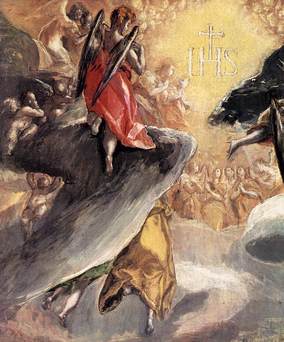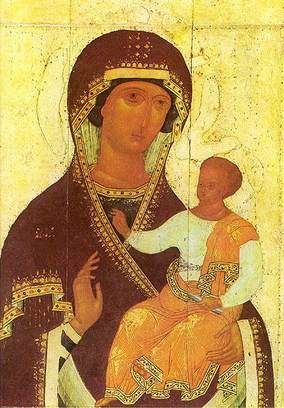The sacred Liturgy of the Church fittingly calls to mind three aspects of worship and gives us the essential qualities of Christian life and praise of God. We can note from the Liturgy the (1) humility of all the characters in today's Gospel, (2) the adoration of the Holy Name of Jesus, (3) and closeness to the Virgin Mary, Mother of God.
Humility proclaims the greatness of God


Approaching to the divine is done only in humility; only in recognizing that we don't make ourselves; only in knowing who we are in front of God, creator of heaven and earth. The gospel tells how to approach God: like the humble people of history:
- Jesus, the Second Person of the Blessed Trinity, was made flesh, who fulfilled the Law with the rite of circumcision and accepted the name given by the angel
- Mary, the teenage virgin who stands in wonder and awe before the Spirit
- Joseph, the righteous carpenter, who protected the Gift
- shepherds, the rustic men who were amazed and glorified and praise God.
Adoration of the Name of Jesus
The last line in today's reading from the Book of Numbers says: "So shall they invoke my name upon the Israelites, and I will bless them." This OT prefiguring of the centrality of the name of Jesus having power is startling and it helps us to keep in mind that Jesus himself said that if you ask anything in his name he will give it to you.
In the Missal of Blessed John XXIII (1962) has the Church celebrate the feast of the circumcision of Jesus, which, besides dedicating a male to God, it is also giving of the name of to the baby. A separate feast day is given for the Holy Name of Jesus in this missal prayed on the first Sunday of teh year, or if Sunday's dates are 1, 6 or 7, the feast falls to January 2.
But connected here we recall that Mary's son was given the name "Jesus," meaning God saves. Paul's letter to the Philippians tells us that God the Father gave us Jesus' name so that at hearing his name we would recognize and adore the name of Jesus above all others (2:9). In another place in the NT we hear Saint Peter saying that "there is no other name under heaven , given to men, whereby we must be saved," and that at the name of Jesus "every knee shall bend, in heaven, on earth and under the earth."
The spiritual teaching of many saints includes a profound reverence for the divine name of Jesus. One can think of Saint Bernard, Saint Bernardine of Siena, Saint John Capistrano, Saint Ignatius of Loyola, the orders such as the Cistercians and Dominicans who promoted the devotion to the Holy Name of Jesus. Pope John Paul II restored the feast of the Holy Name in the 2002 Roman Missal as an optional memorial giving it another day, that of January 3
Catholic custom is at the hearing of the name of Jesus one bends the neck in a slight bow as a sign of respect. Ultimately, the feast takes seriously the dominical saying, "hallowed be Thy name."

Closeness to Mary, the Mother of God

The feast we observe on this the first day of January is an old Marian feast. We recognize that woman gave birth to the Son of God. It is through Mary that we know the face of God, who had a heartbeat. Indeed, through her 'yes' to God's invitation the Eternal Word of God became man, in fact, God-man. Theologically, through Mary the activity of the Holy Spirit is made known to the world. That is why we say, "Come Holy Spirit, come through Mary" as a pious aspiration. In the Year of Grace Pius Parsch says that "she is the priestess who joyfully and solemnly offers on high the Lord's fruitfruits of sacrifice in redemption" (vol 1, p. 246).
For a man schooled in Jewish theology and the Law, Saint Paul acknowledges and preaches that in the divine plan we personally meet God. In his letter to the Galatians, Paul states: "When the fullness of time had come, God sent his Son, born of a woman, born under the law, to ransom those under the law, so that we might receive adoption as sons." Further on Paul says that we are "no longer a slave but a son, and if a son then also an heir, through God." How did this happen? It happened through a woman allowing herself to be disponable to God. That Mary was close to her son Jesus, who is our brother and Savior, Mary our Mother advocates our cause with her Son. Mary is the mediatrix of graces. That is, she intercedes on our behalf with Jesus. And as some preachers will say, "a Jewish mother always gets what she wants from her son." Mary, the Mother of God, pleads our cause if we go to her with our heart open and supple for grace to be received.
In looking at what the Liturgy gives to us we can put the words of the Pope on our lips: "In giving ourselves to Christ, our Hope, you, O Mother of God, are always present."


Leave a comment